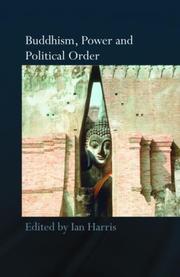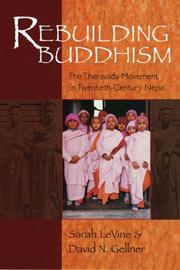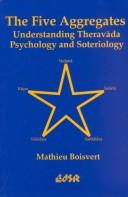| Listing 1 - 10 of 30 | << page >> |
Sort by
|
Book
ISBN: 1138493937 1351026658 1351026666 Year: 2022 Publisher: Milton : Taylor & Francis Group,
Abstract | Keywords | Export | Availability | Bookmark
 Loading...
Loading...Choose an application
- Reference Manager
- EndNote
- RefWorks (Direct export to RefWorks)
"Among one of the older sub-fields in Buddhist Studies, the study of Theravāda Buddhism is undergoing a revival by contemporary scholars who are revising long-held conventional views of the tradition while undertaking new approaches and engaging new subject matter. The term Theravāda has been refined, and research has expanded beyond the analysis of canonical texts to examine contemporary cultural forms, social movements linked with meditation practices, material culture, and vernacular language texts. The Routledge Handbook of Theravāda Buddhism illustrates the growth and new directions of scholarship in the study of Theravāda Buddhism and is structured in four parts: Ideas/Ideals Practices/Persons Texts/Teachings Images/Imaginations Owing largely to the continued vitality of Theravāda Buddhist communities in countries like Sri Lanka, Myanmar, Thailand, Cambodia, and Laos, as well as in diaspora communities across the globe, traditions associated with what is commonly (and fairly recently) called Theravāda attract considerable attention from scholars and practitioners around the world. An in-depth guide to the distinctive features of Theravāda, the Handbook will be an invaluable resource to provide structure and guidance for scholars and students of Asian Religion, Buddhism and in particular Theravāda Buddhism"-- Provided by publisher.
Book
ISBN: 0091069211 Year: 1971 Publisher: London Rider
Abstract | Keywords | Export | Availability | Bookmark
 Loading...
Loading...Choose an application
- Reference Manager
- EndNote
- RefWorks (Direct export to RefWorks)

ISBN: 0415410185 9780415410182 Year: 2007 Publisher: Abingdon ; New York : Routledge,
Abstract | Keywords | Export | Availability | Bookmark
 Loading...
Loading...Choose an application
- Reference Manager
- EndNote
- RefWorks (Direct export to RefWorks)
Buddhism and state --- Theravāda Buddhism --- Political aspects --- Theravāda Buddhism
Book
ISBN: 9781409410928 1409410927 9781409410935 1409410935 Year: 2010 Publisher: Farnham, Surrey, England ; Burlington (Vt.) : Ashgate Pub.,
Abstract | Keywords | Export | Availability | Bookmark
 Loading...
Loading...Choose an application
- Reference Manager
- EndNote
- RefWorks (Direct export to RefWorks)
Theravāda Buddhism. --- Theravāda Buddhism. --- Tipiṭaka. --- Criticism, interpretation, etc.
Book
ISBN: 0231552041 Year: 2020 Publisher: New York : Columbia University Press,
Abstract | Keywords | Export | Availability | Bookmark
 Loading...
Loading...Choose an application
- Reference Manager
- EndNote
- RefWorks (Direct export to RefWorks)
"In this wide-ranging and field-changing work Steven Collins argues that the study of Theravada Buddhism needs to separated from the rather dated and stagnant field of textual history and approached both "civilizationally" and as a "practice of the self." By civilizationally, he means that instead of seeing Buddhism as a set of "original" teachings of the so-called historical Buddha from the 5th century BC to the present, it should rather be viewed as an effort by many teachers and visionaries over time to make sense of what it means to lead a worthy life. The purveyors of Buddhist philosophy did not consider themselves to be preservers of an archaic body of rules and ethical guidelines; they were designing a dynamic way of living and confronting human problems in a timeless way. Using approaches to the very idea of the self promoted by Foucault and Hadot, he compares Theravada Buddhist ways of understanding and "practicing" the self to modernist and postmodernist ideas about "philosophy as a way of life." Rather than applying positivist and historicist approaches, Buddhism should be assessed philosophically, literarily, and ethically, using its own vocabulary and rhetorical tools. Treated in this manner, Buddhist notions of the self can be applied to contemporary ideas of self-care and the promotion of human flourishing. The book covers topics such as spiritual practice, ultimate versus provisional truth, systematic versus narrative thinking, meditation versus virtue, and history versus philosophy. It is a bold and complex way of understanding the impact that Buddhist ways of knowing can have in the world today, bringing them into conversation with modern psychology, literary studies, ethics, gender and sexuality studies, and philosophy"--
Buddhist philosophy. --- Theravāda Buddhism. --- Anātman. --- Self (Philosophy)
Book
ISBN: 1280495960 9786613591197 9004227121 Year: 2012 Publisher: Leiden ; Boston : Brill,
Abstract | Keywords | Export | Availability | Bookmark
 Loading...
Loading...Choose an application
- Reference Manager
- EndNote
- RefWorks (Direct export to RefWorks)
This book discusses how three Old Testament wisdom texts can be interpreted in light of, and as a response to Thai Buddhist interpretations. Its central aim is to explore a new method in Buddhist-Christian dialogue that has three steps. First, Buddhists are asked to reflect on biblical texts, second, the texts are analyzed by placing Christian and Buddhist perspectives side by side, and finally points of convergence and difference are established in order to provide a platform for further dialogue. The study succeeds in demonstrating that the method explored is a fruitful approach to interreligious dialogue which takes interpretations of biblical texts by the religious ‘other’ seriously, and manages to both affirm commonalities and face religious difference.
Christianity and other religions --- Theravāda Buddhism --- Wisdom literature --- Relations --- Theravāda Buddhism. --- Christianity. --- Criticism, interpretation, etc. --- Bible. --- Buddhist interpretations.
Book
ISBN: 0872496120 Year: 1990 Publisher: Columbia University of South Carolina
Abstract | Keywords | Export | Availability | Bookmark
 Loading...
Loading...Choose an application
- Reference Manager
- EndNote
- RefWorks (Direct export to RefWorks)
Buddhist ethics --- Social ethics --- Theravāda Buddhism --- Wealth --- Wealth --- Doctrines --- Moral and ethical aspects --- Religious aspects --- Theravāda Buddhism
Book
ISBN: 1134283121 1280105356 0203537068 9780203537060 9781134283071 9781134283118 9781134283125 9780415345194 9780415600019 1134283113 Year: 2005 Publisher: New York London RoutledgeCurzon
Abstract | Keywords | Export | Availability | Bookmark
 Loading...
Loading...Choose an application
- Reference Manager
- EndNote
- RefWorks (Direct export to RefWorks)
Early Buddhist Metaphysics provides a philosophical account of the major doctrinal shift in the history of early Theravada tradition in India: the transition from the earliest stratum of Buddhist thought to the systematic and allegedly scholastic philosophy of the Pali Abhidhamma movement. Entwining comparative philosophy and Buddhology, the author probes the Abhidhamma's metaphysical transition in terms of the Aristotelian tradition and vis-à-vis modern philosophy, exploits Western philosophical literature from Plato to contemporary texts in the fields of philosophy of mind and cultu
Abhidharma. --- Buddhism --- Theravāda Buddhism --- Buddha and Buddhism --- Lamaism --- Ris-med (Lamaism) --- Religions --- Buddhist psychology --- Psychology, Buddhist --- Buddhist philosophy --- Psychology. --- Doctrines. --- History --- Therava da Buddhism

ISBN: 0674019083 9780674019089 Year: 2005 Publisher: Cambridge (Mass.) : Harvard university press,
Abstract | Keywords | Export | Availability | Bookmark
 Loading...
Loading...Choose an application
- Reference Manager
- EndNote
- RefWorks (Direct export to RefWorks)
Theravāda Buddhism --- History --- Theravāda Buddhism --- Theravāda Buddhism - Nepal - History - 20th century.

ISBN: 0889202575 Year: 1995 Publisher: Waterloo, Ont., Canada : Published for the Canadian Corporation for Studies in Religion/Corporation canadienne des sciences religieuses by Wilfrid Laurier University Press,
Abstract | Keywords | Export | Availability | Bookmark
 Loading...
Loading...Choose an application
- Reference Manager
- EndNote
- RefWorks (Direct export to RefWorks)
Salvation (Buddhism). --- Skandhas. --- Theravāda Buddhism --- Doctrines. --- Psychology. --- Salvation --- Theravāda Buddhism --- Buddhism.
| Listing 1 - 10 of 30 | << page >> |
Sort by
|

 Search
Search Feedback
Feedback About UniCat
About UniCat  Help
Help News
News